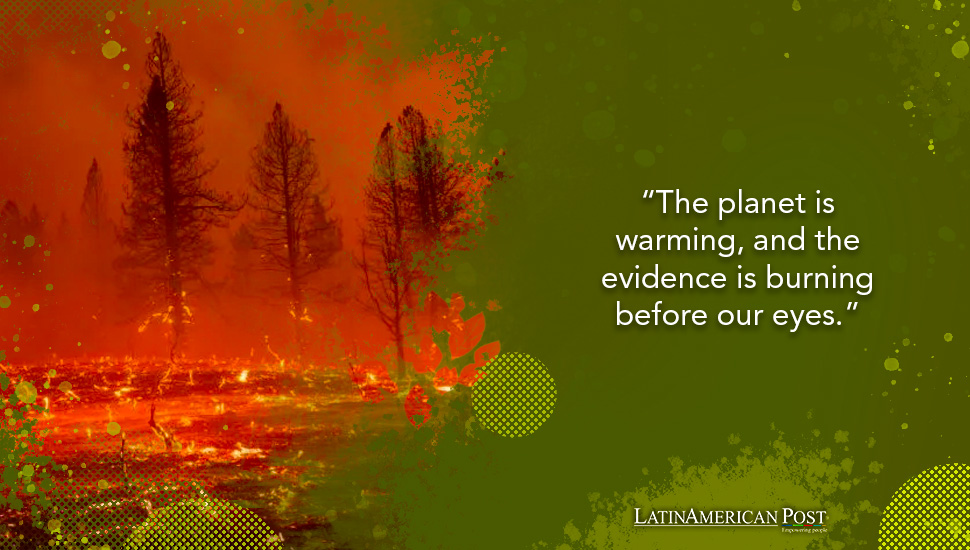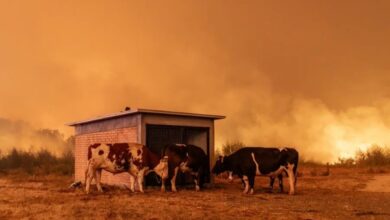Climate Change’s Fiery Wrath: Chile’s Wildfire Catastrophe Signals Global Alarm

The recent devastating wildfires in central Chile, claiming over 112 lives and prompting national mourning, underscore the undeniable reality of climate change. This tragedy, alongside Colombia’s wildfire disaster, highlights the urgent need for global action as extreme weather events become increasingly common.
Rising Infernos: Chile’s Dire Warning on Climate Change
The planet is warming, and the evidence is burning before our eyes. Central Chile’s recent wildfires, which have resulted in the tragic loss of at least 112 lives, serve as a harrowing reminder of the clear and present danger posed by climate change. This catastrophe, occurring in the wake of Colombia’s declaration of disaster over similar infernos, is not an anomaly but a symptom of a broader environmental crisis that demands immediate and concerted action.
Scientists have long warned of the exacerbating effects of climate change on natural disasters, and the situation in Chile exemplifies this dire prediction. A lethal combination of heat waves and prolonged drought, intensified by climate change, has created the perfect conditions for wildfires to ignite and spread with unprecedented ferocity. Santiago, Chile’s capital, recently experienced temperatures soaring to about 37 degrees Celsius (nearly 100 degrees Fahrenheit), a stark illustration of the extreme weather patterns that are becoming increasingly common across the globe.
The science is unequivocal: climate change is lengthening fire seasons, with a study in Nature revealing an average increase of 18.7% in their duration. This extended period of susceptibility to fires amplifies the risk of catastrophic events, providing a larger window for the ignition and spread of flames. Moreover, the disruption of global rain cycles has led to more frequent droughts, leaving vast regions dry and tinderbox-ready. In Chile, abnormally heavy rains in the preceding year spurred the growth of underbrush, only to serve as ample fuel for the ensuing wildfires.
El Niño’s Role: Adding Fuel to the Fire
Adding fuel to the fire, so to speak, is the El Niño weather phenomenon, a natural and periodic event characterized by warming surface waters in the Pacific Ocean. This event has a global weather impact, contributing to the increased temperatures and drought conditions experienced in South America this year. Climate change is believed to enhance the strength and frequency of El Niño events, leading to more intense droughts and, consequently, more severe wildfires.
The implications of these wildfires extend beyond immediate environmental destruction and loss of life. The vast amounts of carbon released into the atmosphere by these fires further exacerbate global warming, creating a vicious cycle of climate change, fuelling natural disasters, and accelerating climate change.
Using satellite imagery, data from the World Resources Institute indicates that wildfires now consume approximately 11,500 square miles of forest annually—an area the size of Belgium and double the amount from two decades ago. This stark increase in forest destruction is a testament to the escalating threat of wildfires in the age of climate change.
IPCC’s Warning: Extreme Heatwaves on the Rise
Furthermore, the Intergovernmental Panel on Climate Change (IPCC) has found that extreme heatwaves, prime conditions for the outbreak of forest fires, now occur five times more frequently due to human-induced global warming. This statistic alone should serve as a clarion call for urgent action to mitigate the effects of climate change and prevent further tragedies.
The devastating wildfires in Chile are not isolated incidents but part of a global pattern of climate-induced disasters that underline the reality of climate change. The evidence is overwhelming, and the time for debate has long passed. Instead, we must focus on implementing comprehensive and aggressive measures to combat the root causes of climate change. This includes transitioning to renewable energy sources, enforcing stricter environmental regulations, and promoting sustainable land management practices to reduce the likelihood of wildfires.
Moreover, international cooperation is paramount in addressing this global challenge. Climate change knows no borders, and its impacts are felt worldwide. A unified global response is essential to combat this existential threat effectively.
Also read: Chile’s Fiery Despair: A Tale of Destruction, Neglect, and Resilience Amid Wildfires
The tragedy in Chile serves as a sad reminder of what is at stake. It is a direct experience of climate change’s devastating effects, offering a glimpse into a future that could become all too common if we fail to act. Let this be a wake-up call to the world: the time for action is now. We owe it to the victims of these wildfires, future generations, and our planet to rise to the challenge and confront the climate crisis with the urgency and determination it demands.





